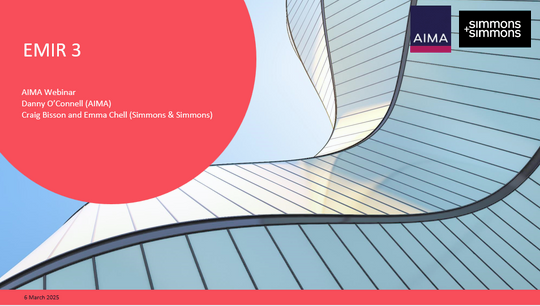UK EMIR reporting changes are live: What you need to know
By Karen Stretch; Richard Chapman; Philippa List, Dechert
Published: 18 November 2024
2024 has been an important year for EMIR reporting.
In April, the EU EMIR REFIT reporting changes took effect, followed, on 30 September, by changes to the UK EMIR reporting regime.
This article takes a high-level look at the changes made to the UK regime, the differences between the EU and UK regimes and what in-scope entities need to know.
Key takeaways
- All derivatives users directly in scope of UK EMIR are affected.
- Whilst very similar, the UK and EU regimes are separate, and there are differences.
- Changes are significant and new processes and procedures may be required.
- The FCA has published an accompanying set of Q&A.
Who is affected?
All derivatives users directly in scope of UK EMIR reporting.
This is not a new requirement: all derivative contracts1 have been subject to a reporting requirement under EMIR since February 2014. However, it is a significant overhaul of those existing rules.
What are the requirements since 30 September 2024?
- Form of reports. All derivative transactions entered into on or after 30 September 2024 must be reported in accordance with the new standards. There is a 180-day transition period, ending on 31 March 2025, for existing transactions to be upgraded to the new standards.2 A modification (which includes a lifecycle event) or correction to an existing transaction report before then prompts an earlier upgrade.
- Reconciliation and verification – new processes and requirements. New trade repository (TR) verification and reconciliation processes have taken effect. Counterparties, the entity responsible for reporting (ERR) and the report submitting entity, as applicable, must have put in place arrangements to ensure that feedback on reconciliation failures provided by TRs pursuant to the new rules3 is taken into account and where that feedback identifies reconciliation failures, they are resolved where possible, as soon as practicably possible.
- New notification requirement. The ERR must notify the relevant regulator of any material errors or omissions in its reporting, as soon as it becomes aware of them. There is no prescriptive definition of “material error or omission’ but the new FCA Q&A (see below) provide steer and focus on proportionality. Specific reference is made to the assessment of materiality being based on the size, nature and complexity of the business in question. The form to notify the FCA of any such errors or omissions is unchanged.
- FCA Q&A. Following consultation, the FCA published a set of questions and answers on the new UK reporting requirements (the Q&A), which have also applied since 30 September 2024.4 The Q&A, which cover 11 areas, including the key topics of reconciliations and errors and omissions, must be read alongside the Policy Statement and other supporting documentation listed on the FCA’s EMIR reporting obligation webpage, including the latest (updated) validation rules. The FCA also consulted on further Q&A5 specifically to support TRs in the implementation of the updated UK EMIR reporting requirements (Draft Q&A). The consultation closed on 25 September 2024 and final guidance will be published via the FCA Trade Repositories webpage.6
Why do I need to know?
- Compliance timeline. The FCA’s expectation was day one compliance. The same is true for updates to historic transactions. For the latter, the Q&A refer to ERRs proactively engaging with the FCA ahead of the 31 March 2025 deadline, with an explanation, if there is a risk that outstanding reports will not be updated in time.
- Minimum expectations. For errors and omissions, the Q&A state that, at a minimum, ERRs are expected to have systems and controls in place to ensure timely and complete reporting in accordance with UK EMIR. ERRs should also have in place: (i) effective governance to oversee their UK EMIR reporting; (ii) effective systems and controls to identify and remediate errors and omissions; and (iii) arrangements with counterparties to address reconciliation breaks. The Q&A refer to ERRs using the information provided by the TRs in the Warnings Feedback messages to monitor the accuracy of their reporting by investigating the potential issues. In turn this can inform any remediation, and whether any material errors and omissions notification is required.
- Reconciliation breaks. The new requirement to have arrangements in place to ensure the remediation of reconciliation breaks as soon as practically possible highlights a focus on reconciliation. The expectation is that ERRs have arrangements to remediate reconciliation breaks that are appropriate to the nature, scale, and complexity of their business. The Q&A confirm that the FCA does not intend to provide prescriptive guidance as to when and how counterparties should remediate breaks because the nature and severity of reconciliation breaks varies.
How do the EU and UK rules differ?
- Legal framework. The UK framework is principally set out across the Policy Statement, the Q&A, validation rules and XML schema. The EU rules are housed in six implementing and delegated regulations supported by the ESMA “Guidelines for reporting under EMIR” (the ESMA Guidelines).7 The ESMA EMIR reporting landing page8 includes comprehensive detail on other resources, including the validation rules.
- Reporting fields and other technical aspects. Only the UK rules include the (optional) execution agent field. There are other differences across the more technical aspects, including between trade state reports and XML schema. The Q&A is explicit that the Warnings Feedback messages (which identify missing data and potential outlier values even though the reports have not been rejected) should be used to help identify and remediate possible errors and omissions.
- Notification requirement. The EU regime includes a three-limb notification requirement to the relevant national competent authority.9 This must be read alongside the ESMA Guidelines which, for the purposes of determining ’significance’, set out a quantitative and a qualitative test. In comparison, as mentioned above, the UK regime includes a requirement to notify the FCA of any material errors or omissions in reporting.
Tips and traps
- Resources and support are plentiful – the FCA EMIR landing page includes comprehensive detail on UK EMIR reporting and related resources.10
- Delegated reporting – users of delegated reporting services should already have engaged with delegates to understand how to address the changes for both new and legacy transactions. This should be an ongoing dialogue, particularly where issues arise.
- ERR – this is a new field for OTC derivatives only, for both EU and UK reporting. It refers to the legal entity responsible for reporting as set out in EMIR. EU and UK EMIR are consistent in this respect. Under the UK EMIR regime, for alternative investment funds, this means the UK alternative investment fund manager, and for UK UCITS, the UK UCITS management company.
- Reconciliation – ensure you can access and process information on reports and reconciliation issues.
- Policies and procedures – consider new or revised policies, arrangements and procedures to afford the necessary oversight to ensure compliance with the new requirements.
Post 30 September 2024
At the time of writing, an on-going issue with the UK regime is the absence of an execution agent field on margin and collateral reports, which may impact the ability of TRs to share details of affected reports with executing entities. The FCA has formally acknowledged the issue by way of the Draft Q&A, stating that it expects affected parties to consider any reasonable steps that could be taken to ensure the accuracy of their reporting whilst this issue persists.
In the EU, the most recent milestone was the 26 October 2024 deadline for conforming historic trades to the revised requirements.
Work of industry associations in the area continues. Recently a list of key EMIR reporting contacts was published.
More changes to EMIR are coming
For those market participants affected by EU EMIR, more change, in the form of EMIR 3.0, is to come. EMIR 3.0, which is expected to be published in the Official Journal of the EU before year end, will bring changes across various aspects of EU EMIR. Certain of those new requirements will take effect straight-away.
1. Both over-the-counter (OTC) derivatives (including cleared derivatives) and exchange traded derivatives.
2. The February 2023 joint FCA/Bank of England Policy Statement (PS 23/2) is available here (the Policy Statement). Accompanying schemas and validation rules are available here.
3. EMIRR 2.3.5R of the FCA Handbook.
4. Q&A are here.
5. Draft TR Q&A are here.
6. FCA Trade Repositories webpage is here.
7. ESMA Guidelines are here.
8. ESMA EMIR Reporting Landing Page, click here.
9. Per Article 9(1) of Commission Implementing Regulation (EU) 2022/1860, click here.
10. See here. The FCA’s EMIR Reporting webpage, click here.
The FCA’s expectation was day one compliance. The same is true for updates to historic transactions. For the latter, the Q&A refer to ERRs proactively engaging with the FCA ahead of the 31 March 2025 deadline, with an explanation, if there is a risk that outstanding reports will not be updated in time.









